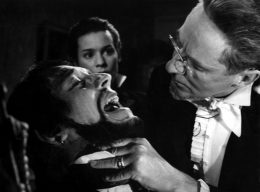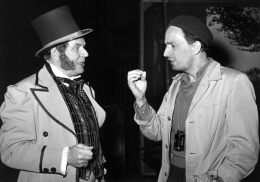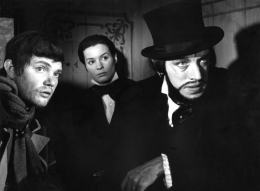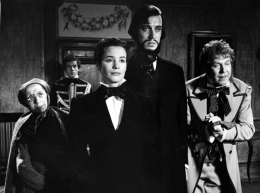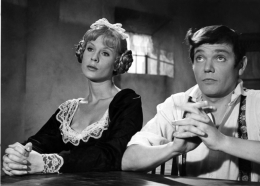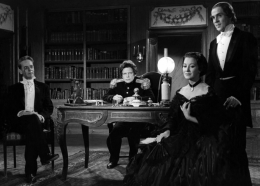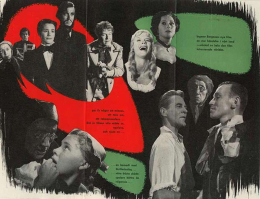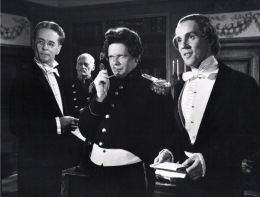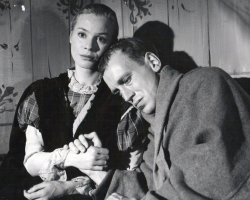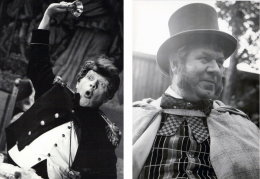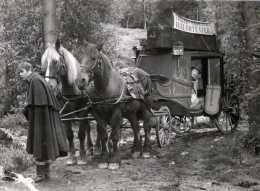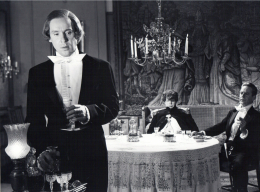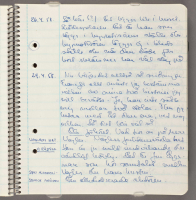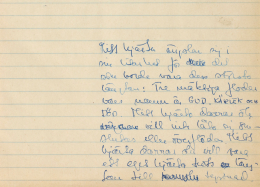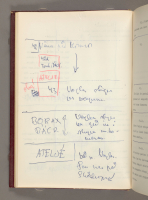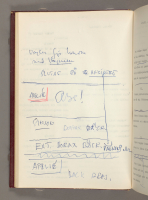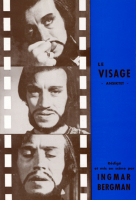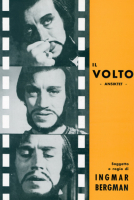The Magician
An itinerant magician is confronted by a sceptical audience in this drama about the privations of being an artist.
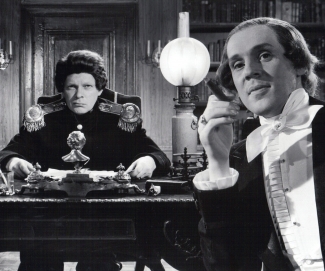
'In every way the film became a little crueller, a little blacker, a little more brutal that I'd meant it to be.'Ingmar Bergman
About the film
The shooting, which took place exclusively in Filmstaden's studios, began on June 30 and terminated on August 27, 1958. The film was awarded the jury's special prize at Venice Film Festival in 1959.
Contemporary critics interpreted the film in different ways, ranging from one extreme: that it was faithfully based on a pre-Christian legend, to another: that it was scurrilous yet accurate portrayal of the setup at the Malmö City Theatre during Bergman's time there. Others noted that the film was remarkably similar to G K Chesterton's play Magic, which Bergman had staged at the Gothenburg City Theatre in 1947.
In Bergman on Bergman:
'I tried to sell the idea to Carl-Anders Dymling, but he was extreamly dubious. So I said: 'You understand, this is an erotic play, the whole thing's one big erotic game. When the entertainers arrive at the country house everyone becomes confused and sensually excited and crazy, and the result is a wild erotic explosion.' That wasn't just a pack of lies of course, it ws also a bit like what I'd imagined. But then during the filming I suppose I must have gone rancid.'
Sources of inspiration
Bergman in Images: My Life in Film:
I directed stage plays at Malmö City Theater from 1952 to the beginning of 1959. Consequently, The Magician, born during the summer of 1958, mirrors the experiences from that period [...]. In comparison, we had remarkably pale relation with the city's inhabitants and very little contact with outsiders. When I was managing director for the theater in Helsingborg, things were completely different. The people in Helsingborg thought it was great fun to have actors in town [...]. We were invited to castles and mansions if we in turn would sing, read, or act. We felt enmeshed and fully involved in the life of the city. The hospitality and ambiance were great. Malmö, however, was a different kind of city [...], and people displayed a friendly interest in what we were doing, but we kept mostly to ourselves.
The audience to whom we played but with whom we spent mo time is represented in The Magician by the consul Egerman's family. The consul is an amiable, dogged enthusiast who wants to keep his distance and formulate rules, and who, for understandable reasons, panics when he discovers that his wife has become involved with the rabble. In the theater profession we often suffer from the delusion that we are attractive as long as we are masked. The public belives that it loves us when it sees us in light of our work and our public persona. But if we are seen without masks, we are instantly transformed into less than nothing. [...] As I remember it, the police chief in The Magician is a consciously calculated target. He represent my critics. I was a rather good-natured jest with everyone who wanted to keep me in line and master me. [...]
The health official [...] was born out of an irresistable desire to take a small revenge on Harry Schein. Schein was the movie critic at Bonniers litterära magasin, which at the time was a heavyweight cultural organ. Schein is intelligent and arrogant, and what he wrote was echoed in the inner circles. I felt that he treated me in an exceedingly humilating manner, which he later insisted that he did not do.
But the actual focal point of the story is, of course, the androgynous Aman/Manda. It is around her and her enigmatic personality that everything rotates. Manda represent the belief in the holiness of human beings. Vogler, on the other hand, has given up. He is involved in the cheapest kind of theater, and she knows it [...]. If Vogler is a magician, who, even thought he is tired to death, keeps repeating his by now meaningless hocus-pocus, Tubal is the exploiter, the salesman of art. Tubal is Bergman, the director, trying to convince Dymling, the head of the studio, of the usefulness and quality of his latest film [...].
Sources
- The Ingmar Bergman Archives.
- Ingmar Bergman, Images: My Life in Film.
- Stig Björkman, Torsten Manns and Jonas Sima, Bergman on Bergman, (New York: Da Capo P., 1993).
Per-Olov Zennström in Ny Dag:
In the skill, confidence and finesse of its execution so rare in a Swedish film to which all the actors contribute, one recognises the superior way in which Bergman handles the cast, (and) his inspired control over the filmmaking process. Undoubtedly he shares the honour for the many enchanting images during the dramatically shifting scenes with the cinematographers Gunnar Fischer and Rolf Holmquist.
C B-n in Dagens Nyheter:
With The Magician Ingmar Bergman has once again created one of his enormously suggestive films, against which one instinctively tries for long periods often in vain to defend oneself. The Magician is a film on which one could heap the highest praise and the most severe criticism, and both judgements would be equally valid. Yet the film never ceases to fascinate and stimulate. And as always in the case of an Ingmar Bergman film nowadays, it is, of course, one that stands head and shoulders above any other Swedish production.
Robin Hood in Stockholms-Tidningen:
Personally I find The Magician extremely interesting, far more satisfying than Brink of Life, for example. It is more cinematic. Bergman paints in a richer colour scale than ever before. No other filmmaker would have been capable of making this film with its immense register.
Distribution titles
Ansigtet (Denmark)
Ansiktet (Norway)
Arc (Hungary)
The Face (Great Britain)
Das Gesicht (West Germany)
Kasvot (Finland)
Litseto (Bulgaria)
The Magician (USA)
O rosto (Portugal)
El rostro (Spain)
Tvár (Czech Republic)
Twarz (Poland)
Le visage (France)
Il volto (Italy)
Production details
Production country: Sweden
Distributor in Sweden (35 mm): Svensk Filmindustri, Svenska Filminstitutet
Laboratorium: FilmTeknik AB
Production company: Svensk Filmindustri
Aspect ratio: 1,37:1
Colour system: Svartvit
Ljudsystem: AGA-Baltic
Original length (minutes): 100
Censorship: 093.237
Date: 1958-12-13
Age limit: 15 years and over
Length: 2755 metres
Censorship: 093.237
Date: 1963
Age limit: 15 years and over
Length: 2755 metres
Censorship: 093.237
Date: 1968
Age limit: 15 years and over
Length: 2755 metres
Censorship: 093.237
Date: 1974
Age limit: 15 years and over
Length: 2755 metres
Censorship: 093.237
Date: 1976
Age limit: 15 years and over
Length: 2755 metres
Release date: 1958-12-26, Skandia, Eskilstuna, Sweden, 100 minutes
Röda Kvarn, Gävle, Sweden
Cosmorama, Göteborg, Sweden
Flamman, Göteborg, Sweden
Röda Kvarn, Linköping, Sweden
Scania, Malmö, Sweden
Skandia, Norrköping, Sweden
Fontänen, Stockholm, Sweden
Röda Kvarn, Stockholm, Sweden
Röda Kvarn, Uppsala, Sweden
Skandia, Västerås, Sweden
Röda Kvarn, Örebro, Sweden
Filming locations
Sweden (1958-06-30-1958-08-27)
Filmstaden, Råsunda (studio)
Skålhamra at Vallentunasjön, Täby (exteriors)
Skansen, Stockholm (exteriors)
Music
Title: Soldaten stod vid sitt gevär
Composer: Erik Nordgren (1958)
Lyrics: Ingmar Bergman (1958)
Singer: Naima Wifstrand
Title: Guds ord löften ej kunna svika
Composer: Johan Holmstrand (1924)
Lyrics: Johan Holmstrand (1924)
Comment: Instrumental.
Title: Sankt Örjanslåten Alternative title: Örjanslåten
Comment: Instrumental.
Title: Kungssången Alternative title: Ur svenska hjärtans djup...
Composer: Otto Lindblad (1844)
Lyrics: Talis Qualis (Alias) (1844)
Comment: Instrumental
Vergérus: But miracles don't happen. It's always the apparatus and the spiel which have to do the work. The clergy have the same sad experience: God is silent and people chatter.
Johan Spegel: Good evening, sir! My name is Johan Spegel. As you can perceive, I am very ill. Will you mitigate my suffering and offer me a little brandy? Although brandy is my infirmity, it is also my solace.
Johan Spegel: I have always yearned for a knife. A blade with which to lay bare my bowels. To detach my brain, my heart. To free me from my substance. To cut away my tongue and my manhood. A sharp knife blade which would scrape out all my uncleanliness. Then the so-called spirit could ascend out of this meaningless carcass.
Johan Spegel: One walks step by step into the darkness. The motion itself is the only truth.
Judy Bloch, 2004:
A carriage bumps along a wooded path. Inside is a magician, Vogler (Max von Sydow), and his entourage, including his young assistant who in his better moments is a she, the magician's wife (Ingrid Thulin); and an ancient auntie who has a sideline in love potions and, we suspect, eye of newt. They are a down-at-the-heels lot, curious about the devil out in the woods and about death, which joins them in their carriage. They are headed for a politically fraught performance, for the mute Vogler is mocked, as he is sought, for his "animal magnetism". And no one does animal magnetism better than von Sydow. We see hints of Persona (silence as the last refuge of the artist), Fanny and Alexander (family theatrics as its own refuge), and Scenes from a Marriage (in fact, two). But with its fairytale landscape, Expressionist sets, and old-dark-lab sci-fi, The Magician asks to be taken on its own terms. Max the mesmerist and Bergman the magician, each with his "apparatus", effect the willing suspension of belief.
Collaborators
- Max von Sydow
- Ingrid Thulin
- Gunnar Björnstrand
- Naima Wifstrand
- Bengt Ekerot
- Bibi Andersson
- Gertrud Fridh
- Lars Ekborg
- Toivo Pawlo
- Erland Josephson
- Åke Fridell
- Sif Ruud
- Oscar Ljung
- Ulla Sjöblom
- Axel Düberg
- Birgitta Pettersson
- Tor Borong
- Arne Mårtensson
- Harry Schein
- Leif Furhammar
- Sigvard Törnqvist
- Frithiof Bjärne
- P.A. Lundgren, Art Director
- Åke Hansson, Boom Operator
- Gunnar Fischer, Director of Photography
- Rolf Holmqvist, Assistant Cameraman
- Carl-Henry Cagarp, Unit Manager
- Oscar Rosander, Film Editor
- Greta Johansson, Costume Designer
- Manne Lindholm, Costume Designer
- Aaby Wedin, Production Mixer
- Erik Nordgren, Music Composer
- Eskil Eckert-Lundin, Orchestra Leader
- Allan Ekelund, Production Manager / Production Coordinator
- Gösta Ekman, Assistant Director
- Karl-Arne Bergman, Property Master
- Katinka Faragó, Script Supervisor
- Börje Lundh, Make-up Supervisor
- Nils Nittel, Make-up Supervisor
- Ingmar Bergman, Screenplay
- P A Lundgren
